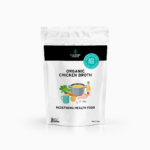 When I wrote Changing Habits Changing Lives nearly 16 years ago, there was scant evidence that it is not the calories, fat, salt and sugar we should be focusing on but rather the quality of the food if we want to be healthy and maintain a healthy weight. But common sense was something my parents had taught me and through my studies and the little information in the science periodicals I came up with the concepts and philosophy of Changing Habits. One chapter in my book talks specifically about the quality vs quantity issue.
When I wrote Changing Habits Changing Lives nearly 16 years ago, there was scant evidence that it is not the calories, fat, salt and sugar we should be focusing on but rather the quality of the food if we want to be healthy and maintain a healthy weight. But common sense was something my parents had taught me and through my studies and the little information in the science periodicals I came up with the concepts and philosophy of Changing Habits. One chapter in my book talks specifically about the quality vs quantity issue.
I feel like for 20 years I’ve been fighting the authorities about this whole issue. It is not the calories, fat, salt and sugar on a food label we should be looking at but rather the quality of the ingredients. So it was very exciting to see the latest research from Harvard that now says that when it comes to keeping your weight down, researchers suggest that the quality of your food matters more than its calorie count.
Intuitively, we know that gorging on burgers and French fries and slurping down soft drinks and sodas leads to more weight gain than eating fresh fruits, veggies and brown rice. But in the most comprehensive and detailed study of its kind, researchers have figured out exactly how much weight gain is associated with the consumption of certain foods.
The worst offenders were potato chips, which led to more weight gain per serving than any other food, the study found. The best nosh for your waistline? Surprisingly, yogurt.
On the potato chip finding, Marion Nestle, professor of nutrition at New York University and author of Food Politics, commented that the weight gain associated with chips and potatoes didn’t track very closely with what we know about how the typical American/Australian eats.
She says it may have less to do with chips per se, and more to do with the fact that people who eat potato chips may eat more junk overall; conversely, people who eat foods like fruit and yogurt are probably more health-conscious. “I think it’s likely that potato chips and French fries are markers for junk food diets, and yogurt is a marker for healthy diets,” says Nestle.
In general, Nestle says, the findings echo nutrition experts’ advice for eating well. “The study has a clear and consistent message: if you want to gain weight, eat junk foods and drink sodas. If you want to maintain a healthy weight, eat healthy foods. This means following basic dietary recommendations and choosing relatively unprocessed foods — vegetables, meat, dairy, grains, fruits. And don’t drink too much alcohol.”
It matters, of course, how many total calories you take in each day, but the authors say the age-old advice simply to “eat less and exercise more” may be naïve. To control weight over the long term — adults gain about a pound a year on average — the study suggests that people benefit more by focusing on eating right, rather than less.
“For diet, conventional wisdom often recommends ‘everything in moderation,’ with a focus only on total calories consumed,” says Dr. Dariush Mozaffarian, an associate professor of medicine and epidemiology at Harvard Medical School and Brigham and Women’s Hospital, and lead author of the study. “Our results demonstrate that the quality of the diet — the types of food and beverages that one consumes — is strongly linked to weight gain.”
The findings are based on data from three large, long-term government-funded trials looking at diet, lifestyle and health in adults: the Nurses’ Health Study, which has tracked 121,701 women since 1976; the Nurses’ Health Study II, which has followed 116,686 women since 1989; and the Health Professionals Follow-up Study, which includes 51,529 men enrolled in 1986. The new analysis involves 20 years of data on 120,877 men and women from these three cohorts. Researchers tracked changes in participants’ eating and lifestyle habits — and weight — every four years.
The data also showed that eating specific high-quality foods was linked with less weight gain over time. In fact, the more daily servings people ate of fruits, vegetables, nuts, whole grains and yogurt, the less weight they gained.
The yogurt finding — each extra daily serving prevented 0.4kg of weight gain — was unexpected, Mozaffarian says: “This clearly deserves further attention to determine if this is cause-and-effect and, if so, why.”
While diet was most strongly associated with weight gain, lifestyle behaviors mattered too. Exercise was a big one; those who most increased the amount they exercised gained .8 fewer kilograms than those whose exercise patterns changed the least.
Sleep was also a factor: people who slept less than six hours, or more than eight hours, a night were more likely to gain more weight.
And alcohol appeared to be an effective fattener, with each additional drink per day associated with 0.2kg of weight gain every four years.
Like several other previous studies, the Harvard research found an association between watching TV and ballooning weight. “TV watching has stronger links to weight gain than other sedentary activities,” says Mozaffarian, likely because it encourages snacking both while watching and afterward, due to the influence of food commercials. “Turning off the TV is therefore very important — in particular, to improve diet. If TV must be watched, then it should be done without any eating and without any food or beverage advertising.”
The study found that while individual food choices had only modest effects on weight, diet and lifestyle changes in aggregate accounted for large differences over the long term: people who made the fewest dietary changes gained nearly 1.8kg more every four years than those who made the most such changes. “Small dietary and other lifestyle changes can together make a big difference — for bad or good,” says Mozaffarian. “That makes it very easy to gradually gain weight unintentionally, but also means that a little bit of attention to a handful of dietary and other lifestyle changes can prevent this.”
The point is that you should be thinking about your diet and lifestyle habits in a comprehensive way. Healthy changes don’t have to be big, but they should be many. It would be wrongheaded to assume that simply cutting out potato chips, and doing nothing else, will magically make you thin — though it’s a good start.
The study appeared in the New England Journal of Medicine June 2011.
My new book Lab To Table is all about the quality of the food you eat…it is an education program about food. It is not about deprivation but all about finding the healthy alternative to the food you love. Including chocolate!
We also have a range of lifestyle programs available to help you start – or maintain – your real food journey.
Happy changing quality habits.
Cyndi








0 Comments